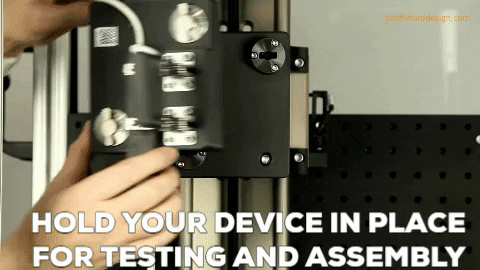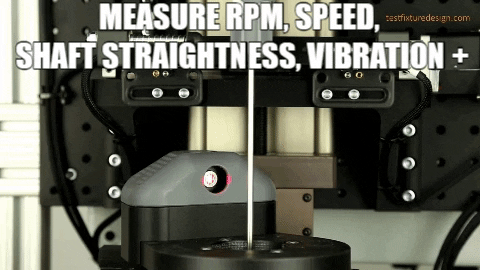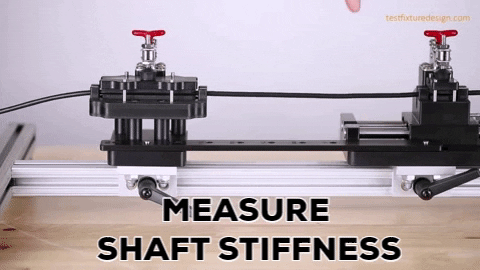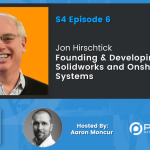Mini Episode | Growing Engineers with Goldilocks Challenges
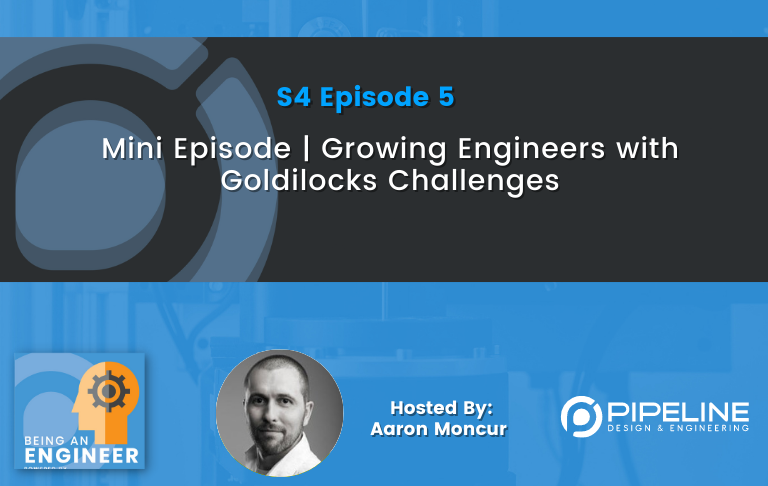
In this series of mini podcast episodes, founder of Pipeline Design & Engineering Aaron Moncur explores a variety of principles he has learned and developed over the last 13 years to grow himself and the engineers on his team. Today’s episode is focused on helping those you lead grow, and specifically about how using “goldilocks challenges” (not too hard, not too easy, but juuust right) can be an effective tool for doing so. Learn how to set and evaluate the degree of difficulty in tasks and challenges you assign to your team to optimize their growth.
EXPAND TO VIEW EPISODE TRANSCRIPTION
SUMMARY KEYWORDS
engineers, grow, challenges, muscle, goldilocks, team, struggling, learn, feeling, goldilocks zone, rcm, principles, gracie, cad, experience, effort, overwhelmed, helpful, frequent, skill
SPEAKERS
Aaron Moncur, Henry Gracie
Aaron Moncur 00:00
Welcome to the being an engineer Podcast. Today we’re going to do something a little different. Typically, I have a guest join me on the show. But today, it’s just me. You see, over the years, I’ve learned and developed a variety of principles for growing my team of engineers and make no mistake, it’s often them that helped me grow. Anyway, I’ve been writing these principles down and have a good sized list of them stashed away in my notes. Now, over the next several months, and perhaps beyond, I’m going to publish a series of these mini podcast episodes, maybe five minutes long each or so, in which I share one of these principles. Today, I’m going to start with something I call Goldilocks challenges, and how we can use them to help our engineering teams and really anyone in life we have the opportunity to lead grow. I’d love your feedback on these mini podcast episodes. So please send us an email at podcast@teampipeline.us. And let us know what you think that’s podcast@teampipeline.us. Or better yet, leave us a review and whatever platform you’re using to listen to this episode. And now, without further ado, here are my thoughts on how to help engineers grow using Goldilocks challenges. In order to help those who lead grow, you have to push them not too hard, not too soft, but just enough. If you push them too hard, there’ll be overwhelmed, get frustrated and not learn. If you don’t push them hard enough, it will be too easy and there will be nothing for them to learn. But if you can find the right balance in between those extremes that stretches them just the right amount, they will blossom. I call these challenges, Goldilocks challenges. Growing is painful. There’s no way around that. Consider the analogy of muscle growth. When our muscles grow, they do so only after being broken down. Anyone who’s been to the gym can attest to the fact that it hurts when your muscles get broken down. It takes effort and requires placing significant stress on the muscle. Oh yeah. body mind connection, you feel it. What follows however, is predictable. The muscle grows, it gets stronger and can handle greater loads. growth as an engineer and as people in general is the same way. However, if you place too much stress on a muscle or on people, the muscle will get broken down so completely that you can’t use it for a long time. And this is not an effective way to build muscle for people.
Henry Gracie 02:56
My name is Henry Gracie, I’m a third generation jujitsu instructor. And today we’re going to talk about self defense the Gracie way.
Aaron Moncur 03:06
I’ve been doing Brazilian jujitsu for several years, and it’s one of the best sports in which I’ve ever participated, and one of the hardest. Currently I’m a blue belt. The next belt the progression of skill is purple than brown and finally black. Occasionally, I’ll roll with a black belt during class. Usually, they’re amazingly patient and helpful as they crushed me with little to no effort. Sometimes one will forget how exponentially inferior I am in terms of skill and just thrash me this is no problem. It’s all part of the game. But in these situations, I find that I don’t learn much because the gap between their capability and mine is just too great. The challenge they represent against my current abilities is beyond that Goldilocks zone. Another example several years ago, I taught a small group of students a framework for using CAD, we call resilient CAD modeling or RCM. Now even for experienced CAD designers the principles of RCM are new and can be tough to master right away. But these were students who had little experience with CAD to begin with. And while my experience using RCM was extensive my experience teaching it was limited at best. I remember all of us the class and myself feeling frustrated, as I struggled to teach and they struggled to learn by mistake I learned was I was asking them to make too big a step all at once in the lessons I’d prepared. Once I realized this and started challenging them with smaller, simpler lessons, they began catching on and the experience became rewarding for all of us. As we lead other engineers, it can be difficult to know where that Goldilocks zone is. How do we know if we’re asking too little or too much of our team? The answer lies in a combination of observation and frequent communication with the individuals we’re leading. Depending on the individual and the situation, I found it helpful to meet with engineers on my team every few days or at a minimum once a week to check in. I asked them how their stress level is, what they’re learning what they’re struggling with, and similar questions. In parallel. I observed them not in a creepy stalker way. But by being in the office when they are in simply noticing their actions. A point here, it’s really helpful to be there in person with your engineers for this, are they getting stuck somewhere? Are they communicating effectively with others? Are they anxious or projecting confidence? Sometimes engineers are so committed to their own growth that they don’t like to admit they’re struggling. This is human nature and completely normal and understandable, particularly for those who are especially driven. For this reason, it’s important for us as engineering leaders to make sure our team feels psychologically safe sharing when they need help. A good way to do this is to set that expectation upfront, you could say something like this, Hey, I’m going to ask you to do something that might be really tough at first, I want you to struggle through it as best you can. But if you get to a point where you’re just spinning your wheels or feeling overwhelmed, please tell me so I can help you. This will be a new and challenging effort for you. So it’s completely fine. If you end up needing help. And if that’s the case, I’ll be more than happy to give it and it won’t mean anything bad for you. Doing hard things is how we grow. As leaders of engineers, we need to give our teams the gift of Goldilocks challenges. Engage your team and frequent dialogue about how they’re feeling. Observe them as they work casually, almost passively. Don’t be overbearing. Let’s not step in right away just because they’re struggling. Struggle is good. Not too much, not too little. With just the right amount. There will be good days and bad. And as leaders, we’ll probably screw up ourselves here and there. At the end of the day, we’ll end up with more capable teams and a more joyful work experience together. I’m Aaron Moncur, founder of pipeline design and engineering. If you liked what you heard today, please share the episode. To learn how your team can leverage our team’s expertise developing turnkey equipment, custom fixtures and automated machines and with product design, visit us at Team pipeline.us. Thanks for listening
We hope you enjoyed this episode of the Being an Engineer Podcast.
Help us rank as the #1 engineering podcast on Apple and Spotify by leaving a review for us.
You can find us under the category: mechanical engineering podcast on Apple Podcasts.
Being an Engineer podcast is a go-to resource and podcast for engineering students on Spotify, too.
Aaron Moncur and Rafael Testai love hearing from their listeners, so feel free to email us, connect on Facebook, Twitter, Instagram, and subscribe on Apple Podcast and Spotify!
About Being An Engineer
The Being An Engineer podcast is a repository for industry knowledge and a tool through which engineers learn about and connect with relevant companies, technologies, people resources, and opportunities. We feature successful mechanical engineers. Interview engineers who are passionate about their work and who made a great impact on the engineering community.
The Being An Engineer podcast is brought to you by Pipeline Design & Engineering. Pipeline partners with medical & other device engineering teams who need turnkey equipment such as cycle test machines, custom test fixtures, automation equipment, assembly jigs, inspection stations and more. You can find us on the web at www.teampipeline.us
You’ve read this far! Therefore, it’s time to turn your headphones up and listen now to this episode to learn all these. Don’t forget to tell your friends who might like this too!








